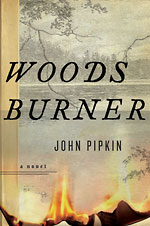Thoreau: Tree-hugger and tree-burner
Woodsburner, a highly acclaimed first novel about Thoreau’s role in a destructive forest fire, probes the smoldering personality of the young Transcendentalist. By Christopher Lancette
You can’t blame first-time novelist John Pipkin for feeling apprehensive when he decided to plunk Henry David Thoreau into the center of a work of historical fiction.
“When I first approached this idea, it was a little bit overwhelming to think of developing a character from such an iconic figure,” Pipkin said of the man who, in real life, accidentally started the blaze that burned hundreds of acres of woods outside Concord, Massachusetts in 1844. “My concern, though, wasn’t so much about the process of how to do it or what people would think about me doing this but about me being able to remain true to the mission of fiction—to make up a good story.”
But it’s clear that Pipkin has done just that. His debut novel, Woodsburner, published earlier this year, has earned wide critical praise. A review in The New York Times noted that Pipkin “beguilingly conjures an assortment of appealing characters.” The Washington Post called it “a profound and thoughtful novel.” Amazon.com named it a “Best of the Month” in May, and last month, Pipkin was awarded the First Novel Prize from the Center for Fiction.
The book opens with Thoreau’s incendiary act. It quickly becomes intriguing as Pipkin drops acorns of hints about what Thoreau’s thoughts and philosophies might have been before they germinated and made him a legend.
There’s an interesting exchange between a book shop owner bogged down in business and family obligations who dreams of simplifying his life and pursuing his dreams as a playwright. Thoreau, however, isn’t optimistic that the heavily encumbered businessman will see them realized.
“You are mired in a life of desperation,” Thoreau ponders, “and do not even know enough to remain quiet about it.”
Thoreau’s early perspective on the falsehood of man’s ability to own land comes to life when he reacts to a man showing him a map of his land.
“Draw as many maps as he will,” he thinks, “a man no more owns this land or these trees than does the blackbird that alights here in search of insects.”
Pipkin strikes a balance between planting such seeds while also probing some less explored pathways in the sojourner’s mind.
“There’s a danger of perpetuating mythology with such a well known figure,” said Pipkin, who grew up in Maryland and now writes and teaches in Austin, Texas. “It would be easy to take readers’ expectations and reinforce them. I tried to show the foundation of the man he would become while avoiding the temptation to just put some of his most quotable thoughts in his head.”
To be fair and to forewarn, Thoreau is the man who sets the drama in motion, but he’s not really the star. Thoreau fans may wish for more of him, but Pipkin’s ensemble cast is full of sparks. The characters also have something in common: fire has made a mark on each of their lives before the conflagration that brings them together, and Thoreau’s forest mishap will test each of them in different ways.
Oddmund Hus was orphaned by a fire his father unintentionally started as the family prepared to disembark the ship that had brought them to America. As an adult, he is tormented by his forbidden love for his employer’s wife. Caleb Ephraim Dowdy is a fire-and-brimstone preacher seeking to rip the sin right from the hearts of New Englanders. There’s also an illiterate book collector, and the book shop owner, Eliot Calvert, whose burdens constantly interfere with his goal of finishing a play that will conclude with a huge fire.
While the Concord fire proves to be a pivotal, if not always positive, moment for the supporting characters, it is with Thoreau that closure comes to the reader and to the author.
“One of the lessons the people of Concord learned from the fire and that Americans were learning in the mid-nineteenth century was about the careless damage that people could cause to resources that seemed so vast and infinite,” Pipkin said. “Thoreau already understood the fragility of that, and that really resonated with me—the impact we can have on the world.”
The process of spending so much time researching, writing, and talking about Thoreau has also left an impression.
“I’ve grown more conscious about the relevance of his thoughts and observations on contemporary life,” Pipkin said. “I’ve really been surprised by how Thoreau continues to play a role not just as a literary canon but in people’s individual lives. One of the worries I had before going out to do readings of the book was that there would be hoards of Thoreauvians upset because I got a detail of his life wrong. That hasn’t happened. People seem to be happy to have more attention drawn to him.”









